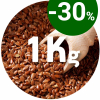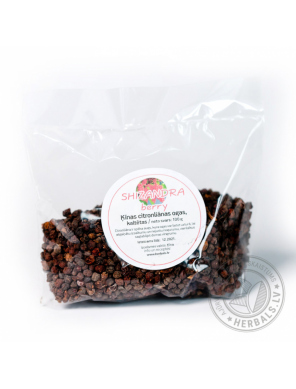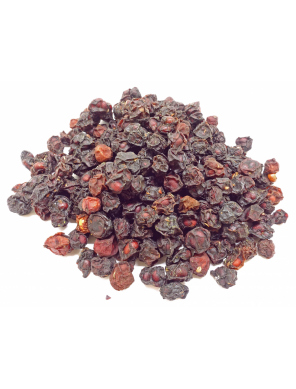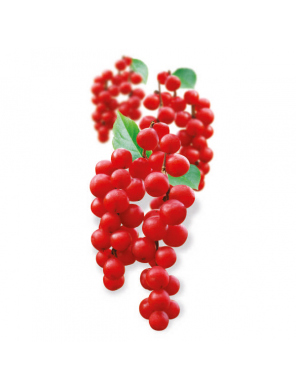Products
- Ayurvedic tea
- Indian teas
- Supplements
- Oils and drinks for health
- Facial Care
- For Skin
- Dental care
- For personal hygiene
- Sport and Yoga
- For Hair Health
- For massage
- Healthcare
- For Women
- Supplements for Men
- Aromatherapy Essential Oil
- Incense sticks
- Indian Food
- Vegan
- Superfoods
- For meditation
- For home
- New Products
- Specials
- Ayurvedic Herbs
- Wholesale
- Gifts and Kits
Browser notifications:
Shizandra Berry
Schisandra chinensis berries
Schisandra chinensis berries, dried
Product origin: China
Packing: 100g
Schisandra chinensis (five flavor fruit) is a fruit-bearing vine. It’s purple-red berries are described as having five tastes: sweet, salty, bitter, pungent, and sour.
Schisandra isn’t typically used as a food. But it has been used for medicinal purposes throughout Asia and Russia for generations.
In traditional Chinese medicine, Schisandra is considered beneficial to qi, the life force or energy inherent in all living things. It’s thought to have a positive impact on several meridians, or pathways, in the body, including the heart, lungs, and kidneys.
Schisandra berries provide powerful antioxidant protection, particularly from free radicals and other toxins in the environment that may cause cellular damage. Regarded as a popular adaptogenic herb, schisandra berries are unique in that they hold a remarkable blend of five distinct flavor properties collectively serving to promote overall health and vitality. Namely, bitter, sweet, sour, salty and hot. Schisandra berries function to enhance the body's natural resistance and adaptation to stressful influences, support mental endurance and promote overall metabolic efficiency.* Much of the clinical research has focused on the effects of Schisandra on liver function, especially its effect on the production of various liver detoxifying enzymes as well as the antioxidant activity of the extract. More research is needed to fully understand all of the schisandra herb’s benefits.
In traditional Chinese medicine, schisandra is believed to have anti-aging properties and to promote physical, emotional, and even sexual stamina. The berries or seeds may be used to treat cough, asthma, indigestion, diarrhea, flu, insomnia, skin allergy, heart palpitations, insulin resistance, and premenstrual syndrome, among other things.
HOW TO USE?
To make schisandra berry tea at home, simmer 1 to 2 Tblsp. of the dried berries in 2 cups of water in a small, covered saucepan for 15 to 20 minutes. This will yield a much more medicinal and flavorful cup of tea than simply pouring boiled water over the herb.
· Try using schisandra tea as an unconventional, but very effective, coffee alternative for an early morning jumpstart, or a caffeine-free energy boost in the afternoon.
· Schisandra blends well with other herbal fruits such as hawthorn, elderberry and rosehips. You can also try substituting schisandra berry in any tea blend that would call for hibiscus.
· Dried berries are made into a powder, which is taken half a gram (knife tip) a few times a day with water, if necessary to restore strength after suffering from illness, physical and mental overload or reduced capacity for work.
Product origin: China
Packing: 100g
Schisandra chinensis (five flavor fruit) is a fruit-bearing vine. It’s purple-red berries are described as having five tastes: sweet, salty, bitter, pungent, and sour.
Schisandra isn’t typically used as a food. But it has been used for medicinal purposes throughout Asia and Russia for generations.
In traditional Chinese medicine, Schisandra is considered beneficial to qi, the life force or energy inherent in all living things. It’s thought to have a positive impact on several meridians, or pathways, in the body, including the heart, lungs, and kidneys.
Schisandra berries provide powerful antioxidant protection, particularly from free radicals and other toxins in the environment that may cause cellular damage. Regarded as a popular adaptogenic herb, schisandra berries are unique in that they hold a remarkable blend of five distinct flavor properties collectively serving to promote overall health and vitality. Namely, bitter, sweet, sour, salty and hot. Schisandra berries function to enhance the body's natural resistance and adaptation to stressful influences, support mental endurance and promote overall metabolic efficiency.* Much of the clinical research has focused on the effects of Schisandra on liver function, especially its effect on the production of various liver detoxifying enzymes as well as the antioxidant activity of the extract. More research is needed to fully understand all of the schisandra herb’s benefits.
In traditional Chinese medicine, schisandra is believed to have anti-aging properties and to promote physical, emotional, and even sexual stamina. The berries or seeds may be used to treat cough, asthma, indigestion, diarrhea, flu, insomnia, skin allergy, heart palpitations, insulin resistance, and premenstrual syndrome, among other things.
HOW TO USE?
To make schisandra berry tea at home, simmer 1 to 2 Tblsp. of the dried berries in 2 cups of water in a small, covered saucepan for 15 to 20 minutes. This will yield a much more medicinal and flavorful cup of tea than simply pouring boiled water over the herb.
· Try using schisandra tea as an unconventional, but very effective, coffee alternative for an early morning jumpstart, or a caffeine-free energy boost in the afternoon.
· Schisandra blends well with other herbal fruits such as hawthorn, elderberry and rosehips. You can also try substituting schisandra berry in any tea blend that would call for hibiscus.
· Dried berries are made into a powder, which is taken half a gram (knife tip) a few times a day with water, if necessary to restore strength after suffering from illness, physical and mental overload or reduced capacity for work.
Also bought
 Omega 3-6-9 Super Mix Bioherba 150g
4.90€
GLUTEN FREE MIX OF CHIA, HEMP AND LINEN POWDER
Omega 3-6-9 Super Mix Bioherba 150g
4.90€
GLUTEN FREE MIX OF CHIA, HEMP AND LINEN POWDER
 AMLA POWDER ORGANIC 100g
8.50€
Dried Indian gooseberry powder
AMLA POWDER ORGANIC 100g
8.50€
Dried Indian gooseberry powder
 SPIRULINA POWDER Herbals Diet 150g
7.00€
Blue-green algae Spirulina powder
SPIRULINA POWDER Herbals Diet 150g
7.00€
Blue-green algae Spirulina powder
Top sellers
 SUPERFOODS GOJI BERRY
10.50€
Goji berries
SUPERFOODS GOJI BERRY
10.50€
Goji berries
 LINSEEDS 1kg AKCIJA -30%
2.79€
Linseeds
LINSEEDS 1kg AKCIJA -30%
2.79€
Linseeds
 SPIRULINA POWDER Herbals Diet 150g
7.00€
Blue-green algae Spirulina powder
SPIRULINA POWDER Herbals Diet 150g
7.00€
Blue-green algae Spirulina powder
This item has been added to cart.












